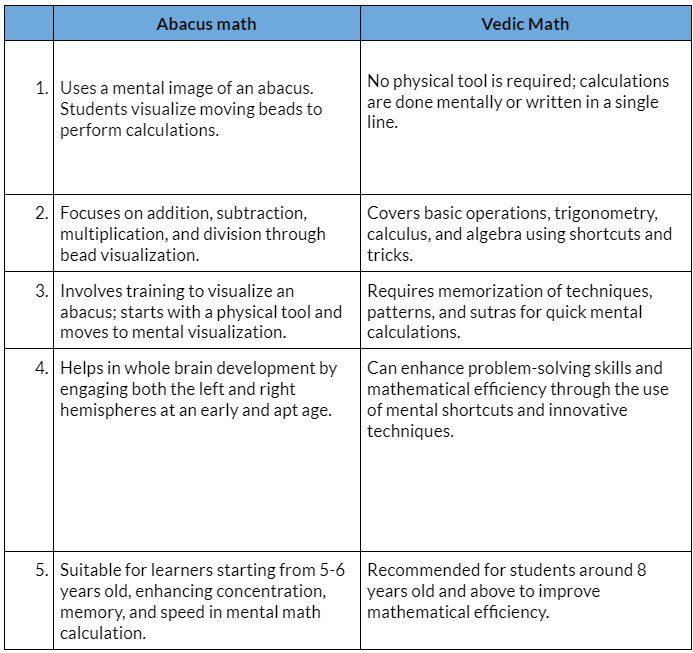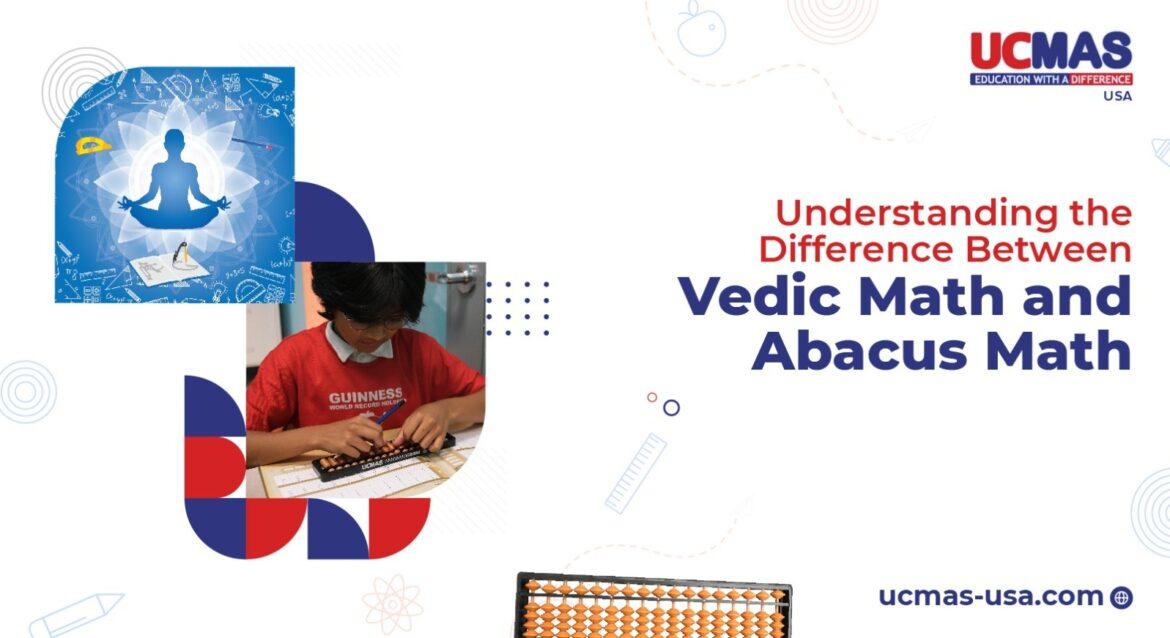We come bearing good news! Math doesn’t have to be boring, difficult, or intimidating! Textbook math, memorizing formulas, and so on often result in the loss of interest by students in the process of learning and understanding math.
Practicing math without understanding the concept will never help anyone. That’s why many parents and educators have adopted a different (we can’t say new) approach to learning math. These methods have been around for centuries and have laid the foundation of many modern mathematical and academic concepts.
Kudos to those who know what we’re on about. For parents still searching for an answer to their child’s math misery, we’re talking about alternative approaches like Abacus math and Vedic math. In this blog, we’ll discuss more about these methods, how your child can benefit from them, and the most important question: is Vedic math or Abacus math better?
Let’s first understand what Vedic math and Abacus math are.
Vedic Math: The What, When, and How.
Here’s a video by Gaurav Tekriwal On Ted-Ed, simplifying the concept of Vedic math.
Vedic math is a system of math that offers several methods or sutras that facilitate quick calculations and simplify complex mathematical operations. Vedic math consists of 16 sutras or formulas and 13 sub-sutras or sub-formulas, which act as guiding principles for problem-solving in arithmetic, algebra, geometry, calculus, etc.
It originated in ancient India and was rediscovered by Bharati Krishna Tirtha in the Vedas (ancient Indian books of knowledge).
Here are some of the benefits of Vedic math for students.
- It helps in simplifying calculations.
- Increases spread and accuracy.
- Promotes better performance in competitive exams.
- Facilitates quick learning.
- Reduces stress associated with math and helps foster confidence.
Abacus Math: The Secret to Math Mastery
The Abacus is known for many reasons; it is the ‘first calculating device’, ‘the first computer’, helps simplify calculation, promotes mental math abilities, and so on. It is used for addition, subtraction, multiplication, and division and consists of beads on rods or wires within a frame. Each column represents a decimal place value. Beads are moved to represent numbers, and calculations are performed by sliding beads accordingly. The abacus is one of the oldest calculating tools, known to have originated thousands of years ago and was used in different civilizations.
Abacus math provides a hands-on and visual approach to arithmetic. Children develop a concrete understanding of mathematical concepts such as place value, addition, subtraction, multiplication, and division by manipulating beads on the abacus. The tactile sensation of moving beads helps reinforce the abstract concepts of numbers and operations, making math more tangible and accessible.
Abacus math not only helps students with their math problems but fosters overall academic confidence and development. Here’s how Abacus can help your child fall in love with math.
- Abacus math teaches children the important skill of problem-solving. It teaches them how to approach a problem systematically and solve it by breaking it down into smaller problems.
- It also promotes the development of essential cognitive skills such as concentration, memory retention, and spatial reasoning.
- Abacus math fosters a new sustainable relationship with math and students find confidence in their newfound math skills.
- It not only enhances conceptual understanding but also develops number sense and improves mental calculation skills.
That’s why we say that the benefits of an abacus extend far beyond your child’s classroom.
Here’s a snapshot of the differences between Vedic and Abacus math.

Vedic Math vs. Abacus Math: Which one is better suited for your child?
Now that you’re aware of the difference between Vedic math and Abacus math, you should be able to make an informed decision about your child’s math journey. Below is a list of factors to consider while selecting between the two.
Ease and Speed of Calculation
The physical manipulation of beads on the abacus provides a tactile way for children to perform arithmetic operations. This hands-on approach not only simplifies complex calculations but also accelerates the learning process.
Vedic math, while effective in mental strategies, may require more time and practice to achieve the same level of proficiency.
Memory Retention
Abacus math fosters memory retention through the repetitive practice of bead movements. Children memorize sequences and patterns, strengthening their recall abilities in the process.
On the other hand, Vedic math relies heavily on mental techniques and shortcuts, which may not provide the same level of reinforcement for memory retention.
Concentration Building
Abacus math demands sustained concentration as children manipulate beads on the abacus to perform calculations. This focused engagement enhances concentration levels using both sides of the brain, a skill that helps children in all aspects of their lives.
While Vedic Math also fosters concentration through mental calculations, the tangible nature of the abacus amplifies the concentration-building experience.


